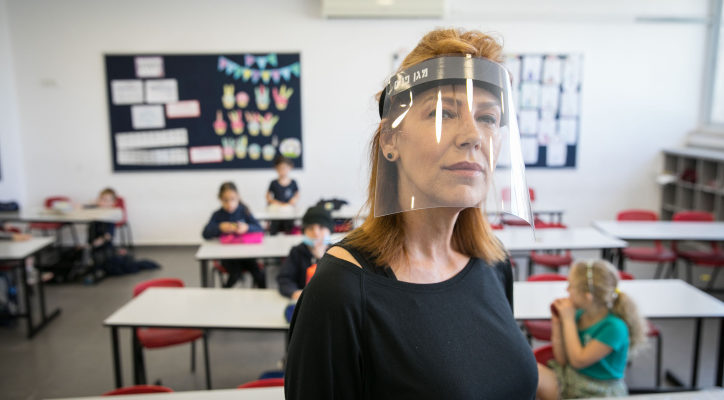One teacher said, “It looks like in order to restart the economy they’re sacrificing our health and our families’ health.”
By David Isaac, World Israel News
Even as Israel eases up on the health restrictions imposed to combat the coronavirus, with some calling for even faster loosening, fears remain, particularly among parents and teachers.
Sunday begins the gradual opening of Israel’s school system, a necessary step to getting the economy back on track. Parents need a place to send their children before they can return to work.
But the return to schools has been met with resistance by some municipalities, responding to fears expressed by teachers and parents.
According to the Education Ministry, 450,000 students from certain grades will return to a partial opening Sunday and receive five hours of instruction daily.
The majority of municipalities have decided to open. But the Education Ministry has decided not to make it mandatory and has left the decision up to the discretion of local municipalities, some of which have decided to hold off, including Tel Aviv, Haifa, Beer Sheva and several others.
“Out of responsibility for the health and well-being of the children and the educational teams we can’t open our educational institutions until we learn, understand and make arrangements according to the guidelines given to us going forward,” said Tel Aviv Mayor Ron Huldai.
Some teachers are afraid to return to work. One told Israel Hayom: “It looks like in order to restart the economy they’re sacrificing our health and our families’ health.”
“They’re turning us and the students into the test rabbits of Israel. It’s impossible really to follow the hygienic guidelines. They’re making us into policemen, they expect us to guard the children during breaks so that they won’t touch each other,” she said.
Parents have also expressed fears about sending their children to school, particularly after an Israeli report found that children do catch and spread coronavirus, even if at a lower rate than adults.
The Education Ministry, aware that some teachers are concerned about infection, decided that teachers over 65 or with background illnesses, or teachers whose nuclear families have patients with background illnesses, will not return to schools unless approved by a physician.
An Israeli psychologists’ group also recommended that parents talk to their children about their fears before sending them to school, warning them of the possibility that they won’t return to their regular classes but will be slotted into new ones. They should be prepared in advance that they won’t see all their friends, the psychologists said.
Another problem is that with the partial opening of schools, some students will return and some won’t. Teachers who have pre-school children were upset at the government for not thinking through the ramifications.
One grade school teacher said, “This is simply absurd. The Education Ministry is asleep at the wheel. They know that many of the young teachers that teach in grade school have young children of their own. Where do they think these children will disappear when they open only grade schools, but not the preschools?”
The Education Ministry decided as a result that teachers with young children who aren’t yet returning to school or kindergarten will remain at home on unpaid leave.
More trouble may be brewing for the Education Ministry with private nursery schools. According to an outline drafted by the ministerial committee dealing with the coronavirus, day care centers and private nursery schools are supposed to open next Sunday, May 10. Only it’s far from clear this will happen.
The organizations that run these centers want compensation from the Treasury for lost revenue during the economic shutdown brought on by the pandemic. Many of the private nurseries were obliged to return money to parents for the months that they were closed. Yet they continued to pay rent and other expenses. They say they can’t afford to reopen.
As part of the compensation, they’re asking 1,000 shekels for each child.
Dr. Shulamit Bismonovsky, director of the organization for private nurseries in Israel, said:
“If we return to a full framework, all that remains for the state is to resuscitate the private nurseries and to return them to life by compensation for the damage that was caused up until today. If we return to a partial framework, it will be on the state to finance the nurseries, which will be forced to work full-time but will receive partial pay.”
The children’s parents, many of whom are independent business owners, also want compensation from the Treasury.





